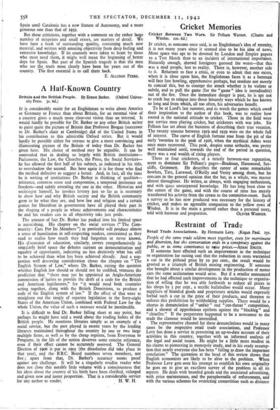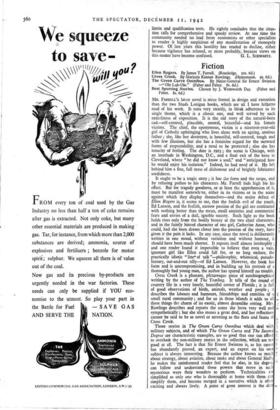Restraint of Trade
Retail Trade Associations. By Hermann Levy. (Kegan Paul. is.
People of the same trade seldom meet together, even for merriment and diversion, but the conversation ends in a conspiracy against the public, or in some contrivance to raise prices.—Anam &AIM.
If someone here effected such an improvement in the technique or organisation for raising coal that the reduction in costs warranted a cut in the pithead price by so per cent., the result would be greeted as a triumph of British mining engineering. If someone else brought about a similar development in the production of motor cars the same acclamation would arise. But if a retailer announced that he had effected such improvements in the technique or organisa- tion of selling that he was able forthwith to reduce all prices in his shops by 5 per cerit., a terrific hullaballoo would occur. Many suppliers of branded goods and proprietary articles would expressly forbid such a cut in the price of their products, and threaten to enforce this prohibition by withholding supplies. There would be a chorus in denunciation of "unfair" and " cut-throat " competition, and a shower of opprobrious epithets against the "blackkg " and "chiseller." If the perpetrator happened to be a newcomer to the trade the clamour would be intensified.
The representative channel for these denunciations would in many cases be the respective retail trade associations, and Professor Levy has done a service in presenting an up-to-date account of their activities in this country, together with an informed analysis of the legal and social issues. He might be a little more modest in his claims to pioneering in monopoly study, and in his ready assump- tion that nearly everyone else has been "failing to draw the important conclusion." The quotation at the head of this review shows that English economists are likely to be alive to the problem. When Professor Levy gets over his attempt to establish his own originality he goes on to give an excellent survey of the problem in all its aspects He deals with branded goods and the associated advertising, with price maintenance, and the paraphernalia of enforcement, and with the various schemes for restricting competition such as distance limits and qualification tests. He rightly concludes that the situa- tion calls for comprehensive and speedy review. At one time the community needed no lead from economists or other specialists to render it highly suspicious of any manifestation of monopoly power. Of late years this hostility has tended to decline, either because vigilance has relaxed, or more probably, because views on
this matter have become confused. G. L. SCHWARTZ.



























 Previous page
Previous page